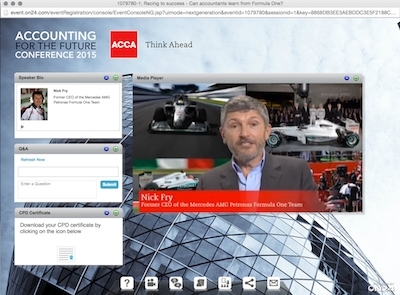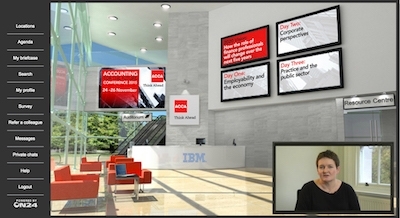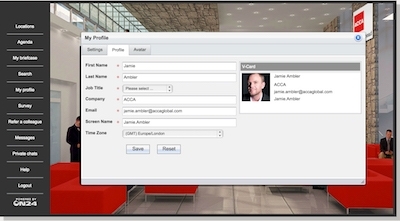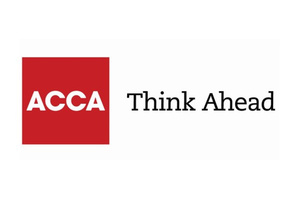Accounting for the future - a three-day virtual live conference
Success Achieved
Accounting for the future - How ACCA build a three-day virtual live conference and had over 5000 virtual delegates in 181 countries watching and engaging.
Organisation
| Name: | Association of Chartered Certified Accountants |
| Member geography: | International |
| Members: | |
| Based in: | United Kingdom |
| Website: | https://www.accaglobal.com |
Accounting for the Future is ACCA’s flagship annual virtual conference, held live over three days in November and then made available to delegates on-demand for a further thee months. The conference consisted of 23 webcasts, including live, social audio sessions and on-demand video sessions in various formats including talks, interviews, debates and masterclasses.
The 2015 conference explored how the working lives of finance professionals will change between now and 2020 and looked at the major trends affecting the accountancy profession. The aim was to keep participants thinking ahead about the role of professional accountants in the 21st century through the most flexible and relevant event technology.
The event was free to attend. ACCA’s global presence means it is uniquely placed to advise and support the profession; to influence governments, regulators and employers to act in the public interest and therefore to deliver public value.
The Accounting for the Future virtual conference is a key channel for us to showcase research that helps to further the science of accountancy and seeks to ensure that our members adopt the highest standards of practice and ethical conduct to enable them to act in the public interest.
Discovery
We want to make our members the most relevant and forward thinking professional accountants. To support our members on their professional career and journey, we need to develop relevant ongoing professional development initiatives like the Accounting for the Future virtual conference. This is also a great way to showcase all the research and insights work that we do at ACCA and address current and topical issues that are important to our stakeholders.
With members in 181 countries, a virtual event provides all our members with the same great content and experience, which we would be unable to replicate with conventional face-to-face events.
Objectives
ACCA’s desired outcomes are:
- To inspire people everywhere in the world to choose ACCA
- To grow our network to support our stakeholders to achieve their goals
- To demonstrate the value of a lasting relationship with ACCA
Accounting for the Future was designed primarily with these three outcomes in mind.
The target audience was primarily ACCA members (of which we were aiming to attract 10,000), but it was also open to any finance professional or member of the public interested in a career in finance, or wanting to keep up to date with recent developments in the accountancy profession.
Project period
January - November 2015
Project Team
Collaborative cross organisation execution involving many different teams.
Project Partners
IBM sponsored the event in exchange for branding.
Activities
From the initial planning meeting to the post event meeting, this entire process took up to 11 months. First step was to decide on the date and the theme for the event. It was important that the theme is relevant and current so it covers issues our members are facing now. It also needed to fit within our corporate strategy and make sure it met our needs as an organisation.
We then approached our national offices around the globe and engaged in conversation with them to find out if they were planning an event that fitted within the theme or if they had the time to host an event within their market. Plans were made for those events to be filmed and edited.
Other areas of the programme were organised centrally by showcasing some of our most up to date research on relevant topics. We needed to decided carefully which sessions would be pre-recorded webcasts and which sessions would be live audio webcasts.
It was a careful balance of engaging the audience with relevant topics that are of interest to them. All of these sessions required training, filming and editing. Some speakers needed to be flown into London for filming so managing their logistics to maximise their time was essential.

We aimed to have a keynote speaker who was inspirational and who we thought had a message that our members would be interested to hear. We had Nick Fry, former CEO of the Mercedes AMG Petronas Formula One Team. He set the scene for the event and spoke about how organisations can be successful in a digital world, how to make the most of new technology and how the human touch to any project is still invaluable.
In the meantime, our design team designed the look and feel of the event and made specific changes to the platform to tailor the user experience. Sometimes we had a sponsor who would have a view about some of the functionality and tweaks and changes were made until everyone was happy.
A full marketing plan was then put into place to maximise all of our assets to advertise the event. We used a range of our magazines, email campaigns, the website and social media to get the word out about the event. All registrations were done online so we could track who had registered, and those who may have needed a nudge.

Lobby area
The conference ran over three days, with events running throughout each day – in effect replicating the more familiar experience of attending a face-to-face conference; we used On 24’s platform to host Accounting for the Future.
On logging in, delegates were welcomed in the lobby area by a video address from ACCA’s chief executive. From there, delegates could visit the auditorium to register to attend webcasts, go to the resource centre to download white papers, online journals, access magazine apps, on each of the three day’s sessions, which were accessible via the media screens in the lobby area.
The technology enabled delegates to create a personal profile, choose an avatar or upload their photo. They could network with fellow delegates, share virtual business cards, chat, as well as being able to search to see who else had registered for the conference and who was currently online. Each delegate had a personal ‘briefcase’ to which they could add any webcasts or supporting materials.

We had at least one live session on each of the days and delegates were encouraged to interact with the speakers by posting questions and taking part in online polling. The moderator asked questions to the panel that had come through live, from the audience that was listening in. These sessions were very popular. Live webcasts were then available on-demand for delegates not able to attend at the time of broadcast.
We also encouraged the audience to network online by providing a networking space as well as scheduled chats to encourage conversation and debate on a particular topic.
Dedicated technical support was available 24/7 while the event was running for anybody needing help with the technology. We also encouraged delegates to interact with the presenters by submitting questions via integrated chat Q&A during the webinars. Session hosts asked key questions to the panel live and a team of moderators also provided responses via chat. In addition, there were 273 one to one chats and 105 emails were exchanged.
After the live days, the content was available on the platform for up to 3 months and all slides, supporting documentation and white papers were downloadable. Once this period was over, we met to talk about the event’s success, look at the statistics, discuss lessons learned, go through the feedback and begin to make plans for the next one.
Challenges
Logistics planning to find available dates for filming was challenging. The only way to overcome that was to be as flexible as possible.
Achievements
This is the fifth year that we have run the Accounting for the Future virtual conference and the first year that we have streamed content over three days – with content on two days dedicated to two of our key target audiences – members working in the corporate sector (day two) and members working in practice and the public sector (day three).
We devised a series of highly relevant sessions for each of these target groups, which resulted in a conference that was easily navigable and felt more relevant to these two key audiences. It also meant that marketing for the event was more effective as content was presented in a more logical way, creating a much better overall customer journey.
Success factors
A comprehensive marketing and communications plan was essential to the success of the event. Also, making sure we had good speakers, who were talking about relevant topics, to keep our audience engaged and who enhanced their experience.
Targets & Statistics

Registrations - actual vs target
What would we do differently?
One thing we will do differently this year is provide all speakers with a full brief for their slides and engage with them earlier to ensure they are following the brief. Using slides in an online event is very different to a physical event and while our speakers are very familiar with PowerPoint, we spent a lot of time getting all slides ready for the platform.
Feedback & Testimonials
“My objectives were to learn from the experiences of the speakers as well as listen to their predictions for the future of accountancy in 2020. My objectives have been met so far as I have learnt from the different experiences shared by the different speakers, for example from Paul Druckman I learnt about the history of the profession and importance of King’s integrated reporting for the future accountant.”
AFF 2015 delegate and ACCA member


